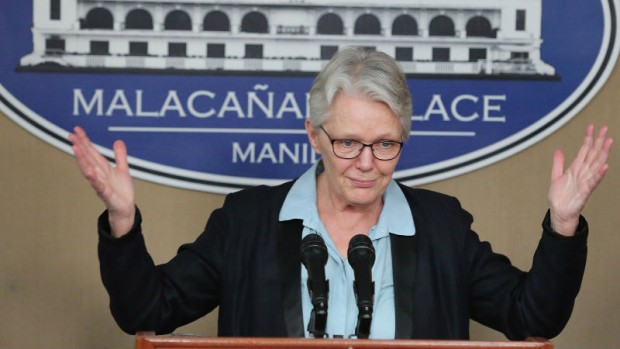
PLUS POINTS Outgoing head for the UN Office for Disaster Risk Reduction Margareta Wahlstrom addresses the media in Malacañang. JOAN BONDOC
ONLY about 10 percent, or some 170 out of over 1,700 cities, towns and provinces in the Philippines have so far joined the United Nations campaign on “Making Cities Resilient to Disaster,” noted the outgoing head of the UN Office for Disaster Risk Reduction (UNISDR), who urged other local government units to sign up for the global drive.
Margareta Wahlstrom said almost 3,000 cities and communities worldwide have joined the program since its launch in May 2010, as the UNISDR initiative has pushed local governments to give more attention to disaster risk reduction (DRR) and develop partnerships with key stakeholders, including civil society and the private sector.
“Local governments are important but communities and people are even more important. So I think this can’t really happen unless communities are fully mobilized,” the UN official said in a Palace press briefing Tuesday.
The Geneva-based agency said more than 120 nations, including the Philippines, have enacted laws to establish policy and legal frameworks on reducing and managing disaster risks.
Proactive
In 2010, the Philippines—one of the most disaster-prone countries in Asia—was cited for passing the National Disaster Risk Reduction Act, described as a “proactive approach to disaster risk governance.”
The country was also among the 86 countries that “set up formal national coordinating bodies for DRR, which create a common language, vision and understanding of the responsibility for the program nationally,” said Wahlstrom, who is also UN Secretary General Ban Ki-moon’s special representative for disaster risk reduction.
Among the initiatives and “striking paradigm shifts” in DRR that the Philippines had initiated are risk information and early warning systems. Manila has also been “developing more sophisticated methods of gauging the impact of typhoons following “Haiyan,” the international name of Supertyphoon “Yolanda” that ravaged Eastern Visayas in November 2013, Walhstrom added.
The country’s National Disaster Risk Reduction and Management Council, or NDRRMC, oversees the government’s DRRM efforts.
Driven advocate
In a related development, the UNISDR named Sen. Loren Legarda Global Champion for
Resilience, for being a “driven advocate of disaster risk reduction policies in the Philippines and Asia, implementing new laws to adapt to climate change and working tirelessly to build sustainable development in Asia.”
Walhstrom expressed hope the senator “will inspire many more governments, parliamentarians, mayors and citizens to follow her path … to achieve resilience.”
In formally receiving her appointment on Tuesday, Legarda said that reducing the country’s risk to disasters and addressing the effects of climate change should be mainstream activities and part of the regular features of daily life.
In a separate statement, the senator said the Philippines and the world needs to work double time to improve resilience even with the people’s increased awareness of disaster risk reduction and climate change adaptation issues.
Action is needed following different nations’ commitment to the Sendai DRR framework, the Sustainable Development Goals, and the Paris Climate Agreement, Legarda said, adding that “these commitments are laudable but we need to move forward fast by turning these commitments into
action—understanding disaster and climate risks to provide suitable solutions, promoting inclusive and sustainable growth, and limiting global carbon emissions, among other urgent actions.”
National priority
The senator, who said she would pursue the creation of a department of disaster risk reduction and climate change adaptation, said resilience should become a national priority and “not just a special provision in our general appropriations act.”
She added: “It will be the heart and soul at the core of
every budgetary process, and at the core of governance.”
Wahlstrom noted that the 2016 Philippine budget was the first ever mainstream national budget that has disaster risk
reduction features, which show how far the Philippines had come.
The UN official said the general perception was that the issue was government’s responsibility alone, even as she expressed hope that the Philippines would continue to work toward mobilizing various sectors to address climate change.
“Governments can’t do it without engagement by every part of society,” she said, adding that more social groups could be tapped to help out.
The UN official was herself cited Monday for her “outstanding service in upscaling resilient, safe and green communities and for the successful passage of the Sendai Framework for Disaster Risk Reduction (2015-2030)” during a March 2015 international conference in Japan.
Wahlstrom was cited by Climate Change Commission Vice Chair Emmanuel de Guzman and Commissioner Heherson Alvarez.